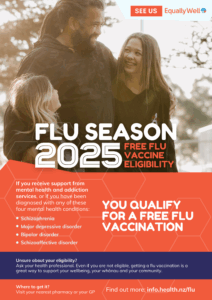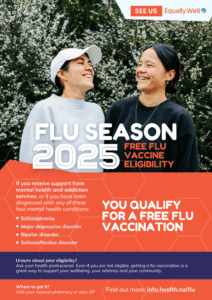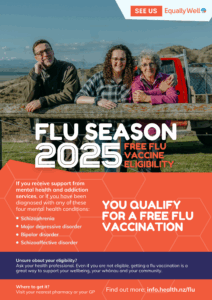
Flu season is underway, and the flu vaccination is now available at local pharmacies, GP practices, and other private vaccination providers.
Since 2022, the flu vaccine has been free for people with specific mental health conditions including schizophrenia, major depressive disorder, bipolar disorder, or schizoaffective disorder, and people who are currently accessing secondary or tertiary mental health and addiction services.
If you are wanting to get a flu vaccination and believe that you may be eligible for the funded vaccine, please talk to a member of your mental health or AOD clinical team, pharmacist, doctor or other support. More information about eligibility can be found here: Flu (influenza) vaccine
Equally Well aim to motivate families, services, and healthcare professionals to take a proactive approach in aiding individuals with mental health and addiction issues to inquire about the funded flu vaccine. This can be done through services, a general practitioner (GP), pharmacy, or pop-up clinic.
What can you do?
Print and display the resources provided by Health New Zealand | Te Whatu Ora, or the SEE US campaign posters, which have been designed to highlight the significance of funded flu vaccines for tāngata whai ora and encourage uptake. You can also share the posters on LinkedIn.
 |
 |
 |
| Download poster option 1 | Download poster option 2 | Download poster option 3 |